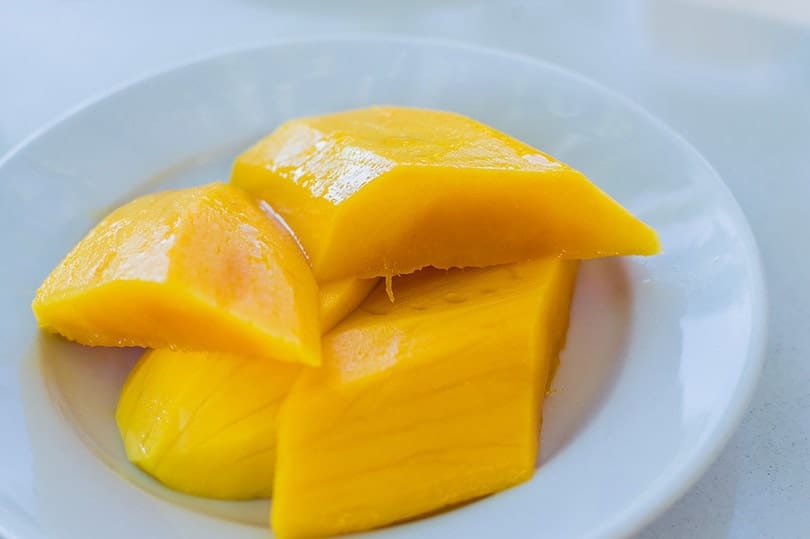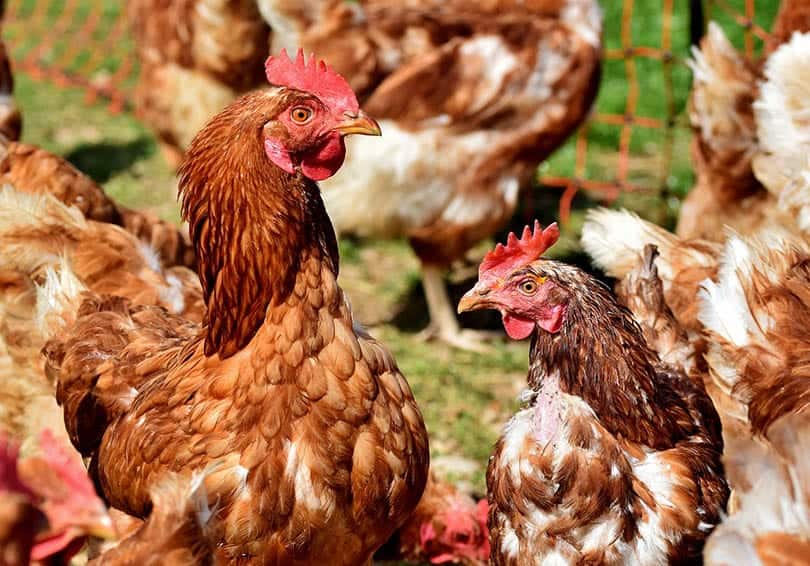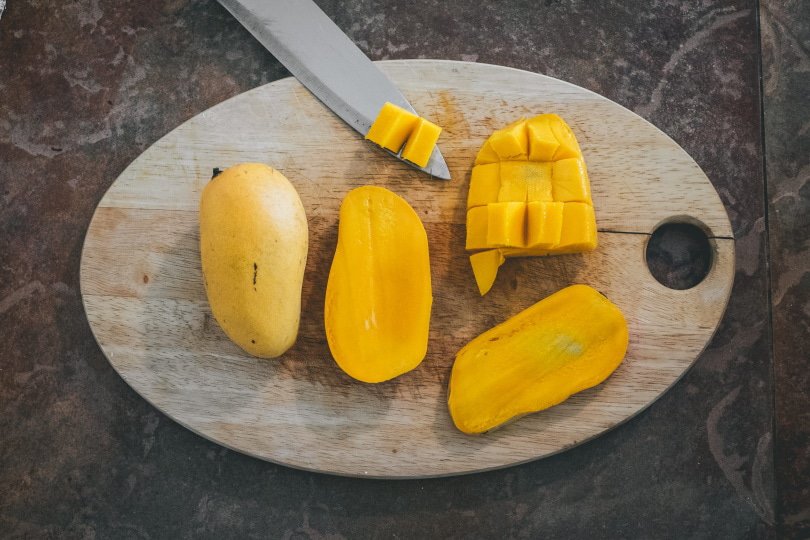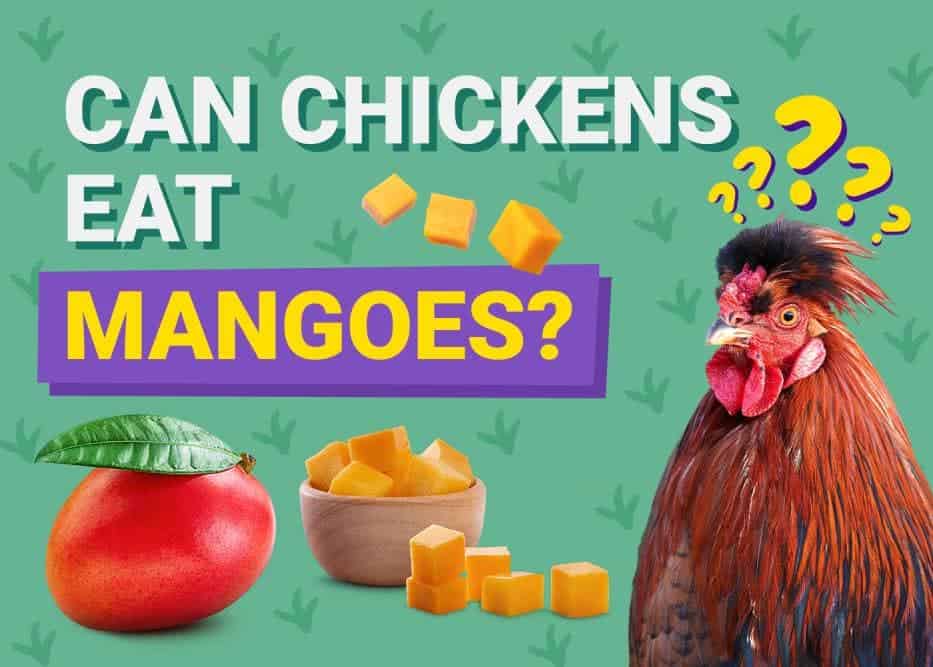Approved by Dr. Maxbetter Vizelberg
If you go outside, rest assured that your chickens will be bothering you for some goodies. Adding a variety of fresh grains, fruits, and veggies is always a good idea. After all, healthy hens equal hardy eggs. So, can chickens delight in a tropical fruit like a mango?
The answer to that is—absolutely. Chickens can certainly munch on this juicy yellow fruit. In fact, it can be advantageous to their diet. Let’s get into the details.

Chickens Can Eat Mangoes
Mangoes might seem like an unusual thing to feed your chickens and maybe even a little expensive. However, mangoes can boost your chicken’s everyday diet, providing a medley of health benefits.
You can serve mango to your chickens a few times a week, permitting that you want to share! Mangoes are a fibrous, colorful, and exotic fruit—taking your flock’s undivided attention at snack time.

Mango Nutrition Facts
Serving size: 1 Mango
- Calories: 201
- Carbohydrates: 50 g
- Sugar: 46 g
- Fiber: 5 g
- Sodium: 3 mg
- Potassium: 564 mg
- Protein: 2.8 g

Benefits of Mangoes
Mangoes have a wide variety of health benefits for people and some pets. Your flock will significantly benefit from the occasional mango in their diet. Here are just a few of the benefits mango has to offer:
Vitamin C
Vitamin C is integral to a poultry diet because it helps your chickens grow and develop skin, tissue, and feathers. It also helps maintain immunity.
Iron
Iron has a lot of significant upsides in your chicken’s diet. Iron promotes general energy, regulates body temperature, and boosts the immune system.
Vitamin B6
Vitamin B6 plays a vital role in immune system function. If your chicken’s diet is higher in vitamin B6, it will strengthen their immunity against common illnesses.
Magnesium
Increased magnesium in your chicken’s diet can produce a more robust egg. It increases the overall hardiness of the shell, providing strong, healthy eggs, which are favorable for gathering and hatching.

Calcium
Since your chicken’s eggshells are made up of 90% calcium, you can understand why calcium is vital in the diet. In addition to creating stronger shells, calcium supports blood clotting and regulates heart rate.
Vitamin D
Vitamin D3 is an essential nutrient for your chickens. It is crucial among hatchlings and laying hens. A lack of vitamin D can negatively impact egg production and even lead to an eventual calcium deficiency. A very young chicken lacking vitamin D can develop deformities.
Cobalamin
Cobalamin, or vitamin B12, is important for the overall health of your flock. It helps nourish the nervous system.
Potassium
Potassium is huge for a flock, especially among egg-laying hens. If your chicks have a diet high in potassium, it can increase egg weight, shell thickness, and overall production.

Downfalls of Mangoes
Of course, mangoes are excellent in addition to your chicken’s average grain and foraging finds. However, they are a supplemental addition—not a primary food source. If your chickens overeat, they can start lacking vital nutrients needed to stay healthy.
First, mangoes are very low in protein. Protein is the main staple of your chicken’s overall diet. These omnivorous creatures thrive on both plant and animal-based protein sources. If your chickens get too high a percentage of mango in their diet, they may not be getting enough protein.
In addition to being low in protein, mangoes are also very high in sugar. A little sugar won’t hurt your chickens. In fact, they will very much enjoy it. But too much sugar can disrupt their natural digestive system and even lead to diarrhea, obesity, and other health concerns. The key point to remember is that mangoes are terrific but in moderation only.
Fresh/Frozen/Canned Mangoes
You can see mangoes offered in a variety of ways. Your chickens can enjoy mangoes freeze-dried, dehydrated, and fresh. These selections are yummy for your chickens and provide some nutritional content. Canned mangoes are likely too high in refined sugar, so you should avoid it.

How to Serve Mangoes to Your Chickens
Considering you’re serving your chicken’s fresh mango, you want to ensure that you wash it thoroughly first. The skin of mangoes can sometimes be very tough, so if it is, it’s best to peel it off. You can slice the mango into small pieces, so it is easy for your chickens to pluck up.
As you know, a hard seed is inside the center of the mango, so simply cut around that and discard it once you finish. You can serve these mango pieces to your chickens as a standalone snack or with a combination of other nutrient-rich fruits and veggies.

Final Thoughts
Mangoes are a healthy, hydrating snack for your flock to enjoy on a hot summer day. So, if you feel like sharing some of the goodies, your ladies will enjoy this tropical fruit’s juicy, sweet goodness.
Now you know just how beneficial mango is in your chicken’s diet. Make sure not to overdo it, as mangoes lack protein and are very high in natural sugar. This tropical fruit will serve as a wonderful little snack on occasion.
